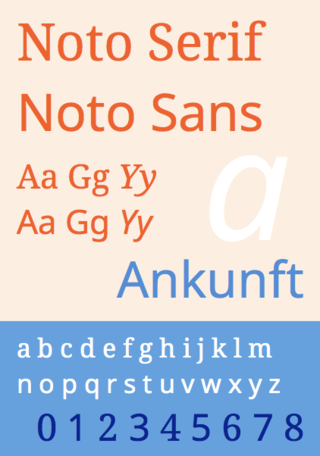
YaST is a Linux operating system setup and configuration tool.
This article outlines the general features commonly found in various Internet forum software packages. It highlights major features that the manager of a forum might want and should expect to be commonly available in different forum software. These comparisons do not include remotely hosted services which use their own proprietary software, rather than offering a package for download which webmasters can host by themselves.
A source-code-hosting facility is a file archive and web hosting facility for source code of software, documentation, web pages, and other works, accessible either publicly or privately. They are often used by open-source software projects and other multi-developer projects to maintain revision and version history, or version control. Many repositories provide a bug tracking system, and offer release management, mailing lists, and wiki-based project documentation. Software authors generally retain their copyright when software is posted to a code hosting facilities.

Markdown is a lightweight markup language for creating formatted text using a plain-text editor. John Gruber and Aaron Swartz created Markdown in 2004 as a markup language that is intended to be easy to read in its source code form. Markdown is widely used for blogging and instant messaging, and also used elsewhere in online forums, collaborative software, documentation pages, and readme files.

The WTFPL is a permissive free software license. As a public domain like license, the WTFPL is essentially the same as dedication to the public domain. It allows redistribution and modification of the work under any terms. The title is an abbreviation of "Do What The Fuck You Want To Public License".
This is a comparison of notable free and open-source configuration management software, suitable for tasks like server configuration, orchestration and infrastructure as code typically performed by a system administrator.

Sandboxie is an open-source OS-level virtualization solution for Microsoft Windows. It is a sandboxing solution that creates an isolated operating environment in which applications can run without permanently modifying the local system. This virtual environment allows for controlled testing of untrusted programs and web surfing.
A Contributor License Agreement (CLA) defines the terms under which intellectual property has been contributed to a company/project, typically software under an open source license.

PackageKit is a free and open-source suite of software applications designed to provide a consistent and high-level front end for a number of different package management systems. PackageKit was created by Richard Hughes in 2007, and first introduced into an operating system as a default application in May 2008 with the release of Fedora 9.

Jami is a SIP-compatible distributed peer-to-peer softphone and SIP-based instant messenger for Linux, Microsoft Windows, macOS, iOS, and Android. Jami was developed and maintained by the Canadian company Savoir-faire Linux, and with the help of a global community of users and contributors, Jami positions itself as a potential free Skype replacement.

RPM Package Manager (RPM) is a free and open-source package management system. The name RPM refers to the .rpm file format and the package manager program itself. RPM was intended primarily for Linux distributions; the file format is the baseline package format of the Linux Standard Base.

Homebrew is a free and open-source software package management system that simplifies the installation of software on Apple's operating system, macOS, as well as Linux. The name is intended to suggest the idea of building software on the Mac depending on the user's taste. Originally written by Max Howell, the package manager has gained popularity in the Ruby on Rails community and earned praise for its extensibility. Homebrew has been recommended for its ease of use as well as its integration into the command-line interface. Homebrew is a member of the Open Source Collective, and is run entirely by unpaid volunteers.

Kiwix is a free and open-source offline web browser created by Emmanuel Engelhart and Renaud Gaudin in 2007. It was first launched to allow offline access to Wikipedia, but has since expanded to include other projects from the Wikimedia Foundation, public domain texts from Project Gutenberg, many of the Stack Exchange sites, and many other resources. Available in more than 100 languages, Kiwix has been included in several high-profile projects, from smuggling operations in North Korea to Google Impact Challenge's recipient Bibliothèques Sans Frontières.

Cloud Foundry is an open source, multi-cloud application platform as a service (PaaS) governed by the Cloud Foundry Foundation, a 501(c)(6) organization.

Noto is a font family comprising over 100 individual fonts, which are together designed to cover all the scripts encoded in the Unicode standard. As of October 2016, Noto fonts cover all 93 scripts defined in Unicode version 6.1, although fewer than 30,000 of the nearly 75,000 CJK unified ideographs in version 6.0 are covered. In total, Noto fonts cover over 77,000 characters, which is around half of the 149,186 characters defined in Unicode 15.0.
Q&A software is online software that attempts to answer questions asked by users. Q&A software is frequently integrated by large and specialist corporations and tends to be implemented as a community that allows users in similar fields to discuss questions and provide answers to common and specialist questions.

Snap is a software packaging and deployment system developed by Canonical for operating systems that use the Linux kernel and the systemd init system. The packages, called snaps, and the tool for using them, snapd, work across a range of Linux distributions and allow upstream software developers to distribute their applications directly to users. Snaps are self-contained applications running in a sandbox with mediated access to the host system. Snap was originally released for cloud applications but was later ported to also work for Internet of Things devices and desktop applications.

The Unlicense is a public domain equivalent license for software which provides a public domain waiver with a fall-back public-domain-like license, similar to the CC Zero for cultural works. It includes language used in earlier software projects and has a focus on an anti-copyright message.
Civic technology is technology that enables engagement and participation, or enhances the relationship between the people and government, by enhancing citizen communications and public decision, improving government delivery of services and infrastructure. This comparison of civic technology platforms compares platforms that are designed to improve citizen participation in governance, distinguished from technology that directly deals with government infrastructure.










